PIONEER XDJ-R1

SETUP
Firmware & Drivers
Firmware (for both Windows and Mac OSX): Update the firmware of the unit to the latest version from http://www.pioneerdj.com/en/support/software/xdj-r1/#firmware-update
Drivers (for Windows only): Install the latest Pioneer ASIO drivers from http://www.pioneerdj.com/en/support/software/xdj-r1/#drivers
No driver is required for Mac OSX computers. Mac OS standard audio driver will be automatically installed when the XDJ-R1 is connected to your Mac with a USB cable.
VirtualDJ 8 Setup
Once VirtualDJ 8 is launched, a Login Window will appear to enter your virtualdj.com account credentials.
A Pro Infinity or a Pro Subscription License is required to fully use the Pioneer XDJ-R1. Without any of the above Licenses, the controller will operate for 10 minutes each time you restart VirtualDJ.
http://www.virtualdj.com/buy/index.html
The Pioneer XDJ-R1 is also operating with the bundled VirtualDJ LE version.

Click on the Use Soundcard button to allow VirtualDJ to apply the pre-defined audio setup with the built-in sound card of the XDJ-R1. Speakers need to be connected at the rear panel of the unit in this case.
If the tailored XDJ-R1 skin is pre-installed, an additional button Change Skin will be available to load the skin, or continue with the default skin of VirtualDJ 8.
An additional Enter Keycode button will be available if the VirtualDJ 8 Limited Edition is installed.
Make your selections and press OK.
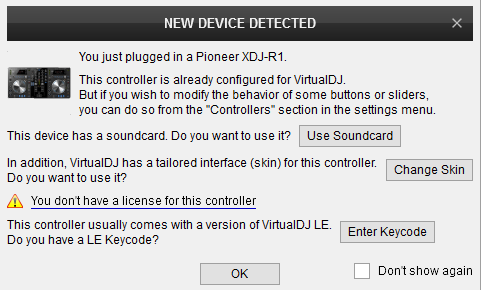
MIDI mode
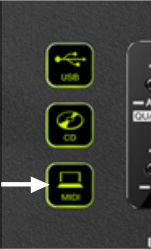

The unit is now ready to operate.
MIDI Operation
The unit should be visible in the CONTROLLERS tab of Config and the “factory default” available and pre-selected from the Mappings drop-down list. The factory default Mapping offers the functions described in this Manual, however those can be adjusted to your needs via VDJ Script actions.
Find more details at http://www.virtualdj.com/wiki/VDJ8script.html

AUDIO Setup
The unit has a pre-defined Audio setup and a special button in the AUDIO tab of Config to provide that.
Alternative Audio setups can be applied in the same window. See Advanced Setup.
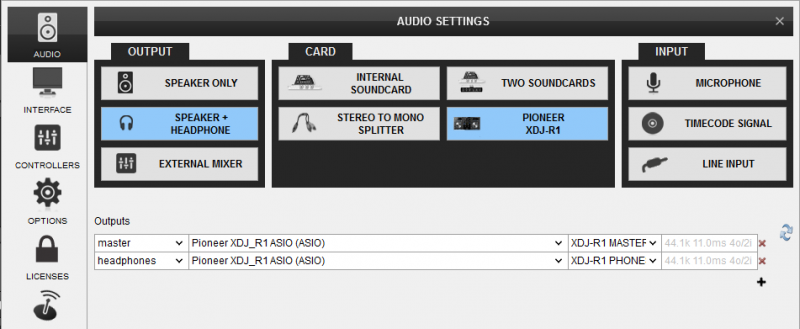
For further software settings please refer to the User Guides of VirtualDJ 8.
http://www.virtualdj.com/manuals/virtualdj8/index.html
LAYOUT
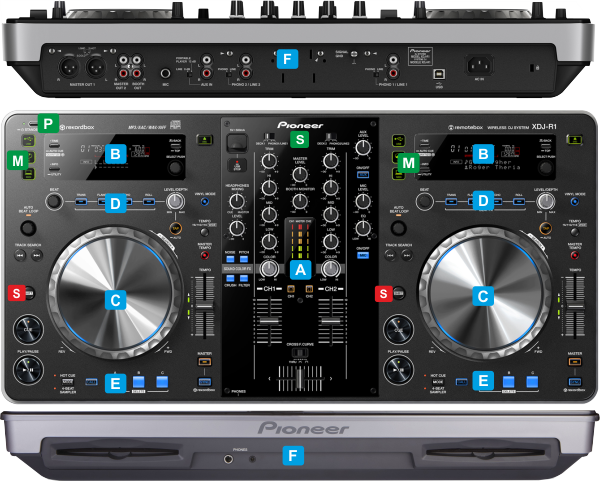
S SHIFT Hold this button down to access secondary functions of the XDJ-R1
P POWER Power on/off the XDJ-R1
M MIDI Set each side of the XDJ-R1 to Midi mode to control the Left/Right VirtualDJ decks.
S SOURCE Set each side of the Mixer to DECK1/2 to control the Left/Right VirtualDJ mixer channel
The functionality of each button, knob and connection per section (as shown in the image above) will be explained in detail in the next chapters
A. Mixer
B. Browser
C. Deck Controls
D.Effects
E. HotCues & Sampler
F. Front & Rear Panels
Mixer
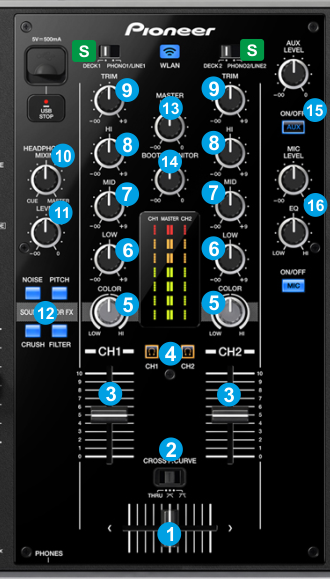
- S USB/DECK SOURCE : Set switchers to DECK1/DECK2 to allow each mixer channel of the XDJ-R1 to control the software mixer channel of each left/right assigned VirtualDJ Deck.
Switch to PHONO/LINE to control the audio signal from the Auxiliary Media Sources
- CROSSFADER: Blends audio (& video if LINK is enabled from the VIDEO panel of VirtualDJ 8 GUI) between the left and the right VirtualDJ decks. The blending depends on the selected curve (2).
- CROSSFADER/CURVE: Select the Curve that the Crossfader will follow.
When in THRU position, both left and right decks will be output at the level designated by the Volume faders (3), regardless the position of the Crossfader (disabled).
When in middle position (Smooth/ Default), the output level of the left and right decks will follow a linear/gradual level when the crossfader is moved from one side to the other.
When in right position (Scratch), the left deck will be muted when the Crossfader reaches the far right position and the right deck will be muted when the crossfader reaches the far-left position. In all other middle positions, both decks will be outputted at a level designated by the Volume Faders (3). - VOLUME: Channel Volume Faders. Faders alter the sound of the left and right software deck.
- CUE/PFL: Use these buttons to select which deck(s) will be sent to the Headphones Channel.
- COLOR: Adjust the Parameter of the selected Color FX depending on the selected Sound Color FX buttons (12). When in middle position, no Effect is applied to the corresponding deck.
- EQ LOW: Adjusts the low (bass) frequencies of the left or right deck.
- EQ MID: Adjusts the middle (mid) frequencies of the left or right deck.
- EQ HI: Adjusts the high (treble) frequencies of the left or right deck.
- TRIM: Adjusts the audio level (gain) of the corresponding channel in the software or hardware Input
- HEADPHONES MIXING: Turn to mix between Cue and Program in the Headphone channel. When all the way to the left, only channels selected by the CUE/PFL buttons (4) will be heard. When all the way to the right, only the Program mix will be heard.
- HEADPHONES VOLUME: Controls the level of the Headphones Output Channel..
- SOUND COLOR FX: Use these buttons to enable/disable a Sound Color FX (its LED will blink when enabled) and then use the COLOR knob (6) to adjust its applied level on the left or right deck.
When the XDJ-R1 is set to MIDI and the PC Mixing mode is selected, the VirtualDJ Color FX Pitch, Filter, Noise and Distortion (Crush) will be used. In all other cases/modes, the hardware XDJ-R1 Color FXs will be used. - MASTER VOLUME: Adjust the level of the Master Output.
- BOOTH VOLUME: Adjust the level of the Booth Output.
- AUX LVL & ON/OFF: Adjust the Output Level of the Auxililary Input. Use the ON/OFF button to route/block the signal of the Auxiliary Input to the Master Output.
- MIC LEVEL/EQ & ON/OFF: Adjust the Output Level of the Microphone Input. Use the ON/OFF button to route/block the signal of the Microphone Input to the Master Output. Use the MIC EQ to adjust the Tone of the Microphone Input.
Browser & LCD Display

The LCD screens are not offering any Track or software information in MIDI mode (firmware limitation). When the left/right side is set to MIDI mode, the LCD screen will display “MIDI CONTROL” and the assigned deck (e.g. DECK A).
- M MIDI: Set both sides to MIDI mode in order to control the Left/Right VirtualDJ Decks
P POWER: Power on/off (standby) the XDJ-R1
U UTILITY: Hold this button down for more than 2 seconds to access the Utilities of the XDJ-R1. See Mixer mode
- TIME: Use this button to toggle the Left and Right assigned decks. The Left side of the XDJ-R1 will toggle between Decks 1 and 3 (A and C) and the right side will toggle between decks 3 and 4 (B and D). The assigned deck will be displayed at the LCD screen each time.
- BACK: Use this button to set the focus of the Browser into the Folders window. When focus is already set to the Folders window, use this button to expand/collapse sub-folders.
Hold SHIFT down and then use this button to cycle through the available Center panels (MIXER, VIDEO, SCRATCH and MASTER) - BROWSE/SELECT Knob/push:
Use this knob to scroll through files or folders (depending on the focused window).
When focus is on the Folders window, push the knob to set focus to the Songs window.
When focus is on the Songs window, push the knob to load the selected track to the left or right deck.
Hold SHIFT down and then use the knob to cycle through the available* views of the Sideview.
Hold SHIFT down and then push the knob to toggle between the Browser Zoom (with Mini Decks) and Normal view.
*: Only the Sampler Trigger pad view is available in LE mode.
Deck Transport & Tempo Controls
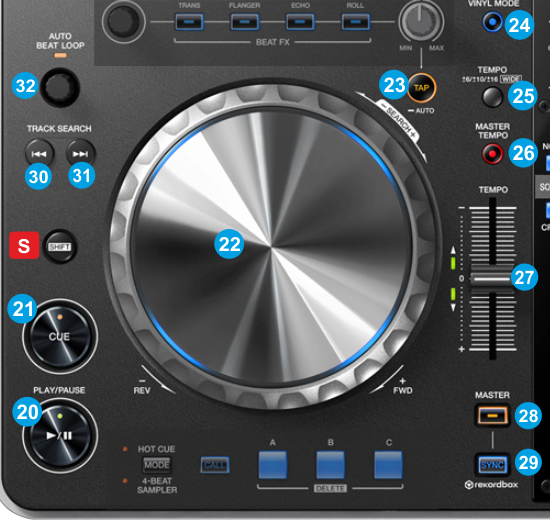
- S SHIFT: Hold this button down to access secondary functions of the XDJ-R1
- PLAY: Plays-Pauses the track.
Hold SHIFT down and then use this button to Stutter Play the track from the Cue position. - CUE: If the track is playing, pauses and goes to the last cue point. If the track is paused, sets the current position as cue point, and previews the cue as long as the button is pressed.
If SHIFT is pressed, it jumps to the beginning of the track. - JOG: Touch sensitive platter for scratch, bend, seek or Effect parameter control.
When in Vinyl mode (VINYL button (24) is turned on), use top area of the Jog to scratch the track and the outer part to bend (temporary speed up/down).
When in Bend mode (VINYL button (24) is turned off) , both top and outer parts of the jog will bend the tempo of the track (temporary speed up/down).
Hold SHIFT down and then use the Jog to fast search (seek) through the track. - TAP. Use this button to manually adjust the tempo of the track by tapping at least 4 times at the desired tempo.
When the track is paused, press this button to set the current position as the beginning of the beat-grid.
Hold SHIFT down and then use this button to re-analyze Temp and Phase of the track (undo manual edits) - VINYL. Use this button to set the jogwheel (22) to either Vinyl (Scratch) or CD (Bend) mode.
- TEMPO RANGE: Use this button to cycle though the available Pitch/Tempo ranges (±6, ±10, ±16 and ±100%)
- MASTER TEMPO: Use this button to enable/disable the Keylock (Master Tempo) feature. When enabled, the track's pitch will be "locked" to its original key. The track's tempo will remain at the speed designated by the Pitch Fader
- PITCH: Adjusts the tempo of the track.
- MASTER: Use this button to manually set this deck as MASTER (all other decks will sync to the MASTER deck).
Note: By default VirtualDJ will automatically select the MASTER deck (in most cases it will be the deck that is playing out to the Master Output). If a deck is manually set as MASTER, then automatic selection stops until the lit MASTER button is pressed again.
- SYNC: Syncs the deck with the Master Deck (will match BPM value and Beatgrid if tracks are playing).
- <<: Use this button to set the Loop In (Start point) of a manual loop. When a Loop is enabled, the button will jump the track to the Loop In point if used.
- >>: Use this button to set the Loop Out (End point) of a manual loop and trigger/complete the manual loop. Press again to exit the loop.
- AUTOLOOP: Use this knob to select the size of the Loop in beats (value is visible on the GUI).
Push the knob to enable/disable the selected Loop.
If a Loop is enabled, hold SHIFT down and then use this knob to move the loop forward/backwards by 1 beat
EFFECTS
The Effects section of the XDJ-R1 provides the ability to select and apply a VirtualDJ Effect on each one of the left/right decks and at the same time apply up to 3 pre-selected ones (Flanger, Echo and Loop Roll).

- BEAT: Use this knob to adjust the 1st Parameter of the selected Effect.
Hold SHIFT down and then use this knob to move the Beat-Grid - TRANS: Use this button to enable/disable the selected Effect.
Hold SHIFT down and then use this button to select the next available VirtualDJ Effect. - FLANGER: Use this button to enable/disable the Flanger VirtualDJ Effect.
Hold SHIFT down and then use this button to set Flanger as selected* (and explicitly control its Parameters with the BEAT and LEVEL knobs) - ECHO: Use this button to enable/disable the Echo VirtualDJ Effect.
Hold SHIFT down and then use this button to set Echo as selected* (and explicitly control its Parameters with the BEAT and LEVEL knobs) - ROLL: Use this button to enable/disable the Loop Roll VirtualDJ Effect.
Hold SHIFT down and then use this button to set Loop Roll as selected* (and explicitly control its Parameters with the BEAT and LEVEL knobs) - LEVEL: Use this knob to adjust the 2nd Parameter of the selected Effect.
Hold SHIFT down and then use this knob to adjust the Volume of the triggered/selected Sample.
*: By default, the “selected” Effect is the one that is either selected from SHIFT+TRANS button or the last triggered one from the pre-selected.
Note. There will not be any visible change when the ROLL FX is enabled and the default skins of VirtualDJ is used (Loop Roll is assigned at the 4th Effect slot- not available in the default skins), therefore is it advised to use the tailored skin of the XDJ-R1.
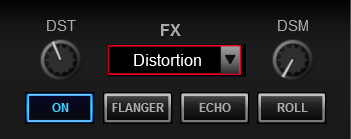
HotCues & Sampler

- HOTCUE/SAMPLER MODE. Use this button to toggle between the HotCues and Sampler mode. The corresponding LED will indicate the selected mode.
- CALL. When the Sampler mode is selected, use this button to load the next available Sampler Bank.
Hold SHIFT down and the then use this button to start/stop recording the deck to a new Sample (available in the Recordings Sampler Folder). LED will blink while the new Sample is being recorded.
When the Hotcue mode is selected, use this button to toggle between the primary Hotcue bank (Hotcues 1 to 3) and the secondary one (Hotcues 4 to 6) - HOTCUE/SAMPLES (1-3). The 3 numbered buttons offer different functionality depending on the selected mode (39).
In HotCue mode, each one of the 3 buttons assigns Hot Cue Point (1 to 3 or 4 to 6 if the secondary bank is selected with the CALL button) or returns the track to that Hot Cue Point if the HotCue is assigned.
When a Hot Cue Button is unlit, you can assign a Hot Cue Point by pressing it at the desired point in your track.
Hold SHIFT down and then press a button to delete its assigned Hot Cue Point.
In Sampler mode, each one of the 3 buttons triggers a Sample from the selected Sampler Bank of VirtualDJ. If the selected bank has less than 4 samples, both sides of the XDJ-R1 will control the same samples. If the selected Sampler bank has more than 3 samples, the left side of the XDJ-R1 will control samples 1 to 3 and the right side will control samples 4 to 6.
The trigger/playing behavior depends on the selected Trigger mode of the Bank (On/Off, Hold, Stutter or Unmute) and can be changed from the VirtualDJ Browser in the Sampler view of the Side View.
Hold SHIFT down and then use the same buttons to stop the sample (useful when the Stutter or Unmute trigger mode is selected).
Front & Rear Panels

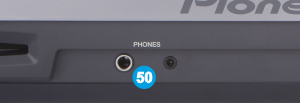
- MASTER OUT 1 (XLR): Connect this low-impedance XLR output to a PA system or powered monitors. The level of this output is controlled with the Master knob on the top panel.
- MASTER OUT 2 (RCA): Use standard RCA cables to connect this output to a speaker or amplifier system. The level of this output is controlled by the Master knob on the top panel.
- BOOTH OUT (RCA): Use standard RCA cables to connect this output to a booth monitoring system. The level of this output is controlled by the Booth knob on the top panel.
- MIC INPUT. Connect a 1/4" microphone to this input. This input's audio signal is routed directly to the Master Output of the XDJ-R1 and its level is controlled by the MIC LEVEL knob at the top panel.
- AUX IN. Connect an external audio source to this Input and control its Input level by the AUX LEVEL knob at the top panel.
- PHONO/LINE INPUTS. Connect your audio sources (CD Players, turntables etc) to these inputs. Inputs 1 and 2 can accept both line and phono-level signals.
- USB. This USB connection sends and receives audio and control information from a connected computer.
- AC POWER: Use the included power cable to connect the XDJ-R1 to a power outlet. The unit is powered on/off by the button at the top panel.
- PHONES SOCKET. Connect your 1/4" or 1/8" headphones to this output for cueing and mix monitoring.
Advanced Setup
Mixer Modes
The XDJ-R1 can operate in 2 different mixer modes.
How to select the mixer mode:
- Press and hold down the INFO/UTILITY button for about 2 seconds until UTILITY is displayed on the LCD screen.
- Turn the SELECT knob until the display shows MIXER MODE.
- Push the SELECT knob to enter the MIXER MODE menu.
- Turn the SELECT knob to select the PC or the XDJ-R1 Mixer mode.
- Push the SELECT knob to set the XDJ-R1 to either the PC or the XDJ-R1 Mixer mode
PC mode (default, must be used with the Limited Edition)
In this mode:
- The mixer of the XDJ-R1 is operating as MIDI and the audio mixing is performed by VirtualDJ (Volume control, EQ, gain etc). The mixer operations are shown at the screen (skin) as well.
- The VirtualDJ Color FX Pitch, Filter, Noise and Distortion are used instead of the hardware ones.
- The Audio setup requires a Master & Headphones audio configuration (offered by the special XDJ-R1 button in the AUDIO tab of Settings).

XDJ-R1 mode (Hardware mixing mode)
In this mode:
- The mixer of the XDJ-R1 is not operating as MIDI, therefore none of the mixer operations (such as Volume faders, Equalizer, Gain etc) will be shown at the screen (skin).
- All the Color FXs are used and applied by the XDJ-R1 (one at a time)
- The Audio setup requires an External Mixer audio configuration (has to be manually set as per the image below).
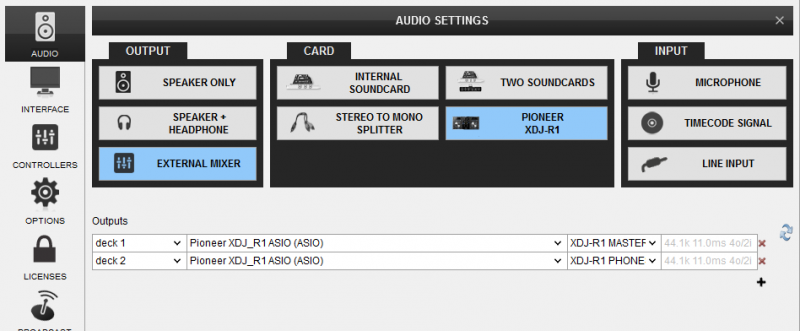
Inputs
The XDJ-R1 offers various Inputs at the rear side of the unit.
LINE/PHONO Inputs (47): Use these 2 Inputs to connect external audio sources such as CD Players, Turntables and other media analogue sources.
The signal of these Inputs is routed to Left and Right mixer Channels.
- Set the left DECK1-PHONO/LINE1 switcher at the top panel to DECK 1 position to assign mixing control of the VirtualDJ Left deck to the left mixer Channel.
- Set the DECK1-PHONO/LINE1 switcher at the top panel to LINE/PHONO1 position route the signal from the LINE/PHONO1 rear input to the left mixer Channel.
- Set the right DECK2-PHONO/LINE2 switcher at the top panel to DECK 2 position to assign mixing control of the VirtualDJ Right deck to the right mixer Channel.
- Set the DECK1-PHONO/LINE1 switcher at the top panel to LINE/PHONO2 position route the signal from the LINE/PHONO2 rear input to the right mixer Channel.
Note: The VirtualDJ Decks will not be muted, regardless the position of the DECK-LINE/PHONO switchers.
AUX Input: Connect any analogue/media source, such as a (MP3, Media Player, iPod etc) at the rear panel of the XDJ-R1 and use the AUX LEVEL knob at the top to adjust its Volume. The signal of this Input is directly routed to the Master Output of the XDJ-R1, as long as the AUX ON/OFF button is turned on.
MIC Input: Connect a Microphone at the rear panel of the XDJ-R1 and use the MIC LEVEL knob at the top to adjust its Volume and the MIC EQ knob to control its Tone. The signal of the Microphone Input is directly routed to the Master Output of the XDJ-R1, as long as the MIC ON/OFF button is turned on.
Both MIC and AUX Inputs (the mix of both signals) can be added as a Sound card input in the Audio Setup of VirtualDJ (as linein or Mic) and routed to the software mix signal.
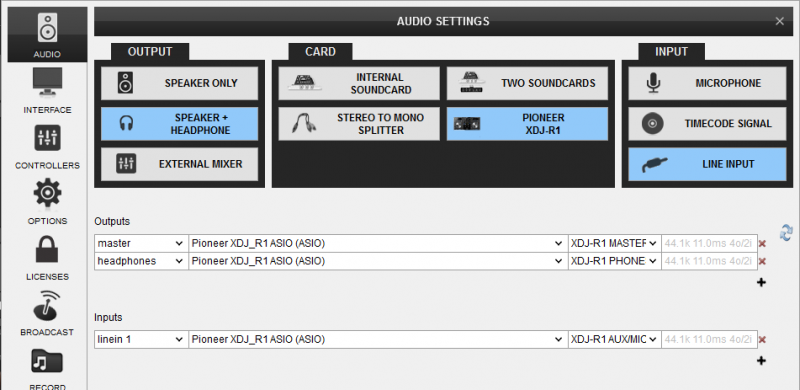
Recording
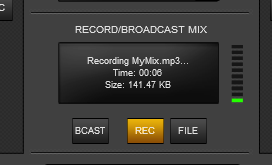
Recording using VirtualDJ is only available when the XDJ-R1 is set to PC mode (see Mixer modes)
When the unit is set to XDJ-R1 (Hardware mode) the recording can be performed using a 3rd party application (such as Audacity) by routing the Booth Output to the Line Input (or Mic Input) of your computer.
If you wish to record the Microphone Input along with your mixing, a Mic line needs to be manually added to the Audio configuration (as per the image below) and the MIC ON button on the skin (in the MASTER center panel) needs to be turned on as well as the Hardware one.
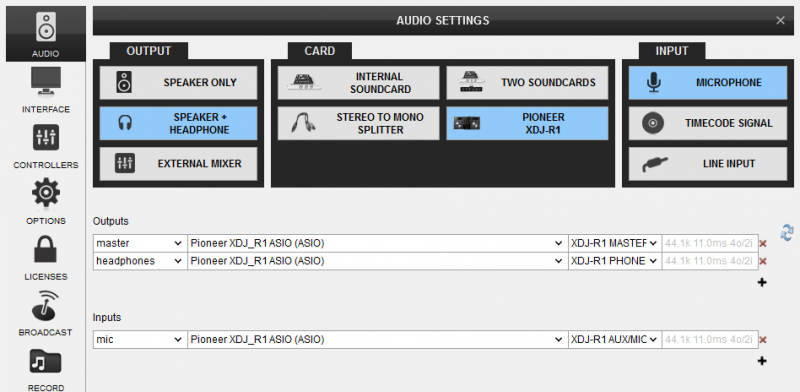
Limited Edition
The XDJ-R1 is bundled with VirtualDJ 8 LE (Limited Edition). The Limited Edition has no time limit in use, and the XDJ-R1 will control VirtualDJ based on the pre-assigned actions.
Some features of VirtualDJ will not be available in Limited Edition. See the comparison chart at http://www.virtualdj.com/products/virtualdj/comparison.html
If you don’t own a Pro Infinity, a Plus or a Pro Subscription license, use the following link to download and install VirtualDJ 8 LE, by entering the LE Keycode that came with your unit.
VirtualDJ 8 LE download link: http://virtualdj.com/le
Launch VirtualDJ 8 and login with your virtualdj.com, Google or Microsoft ID account credentials.
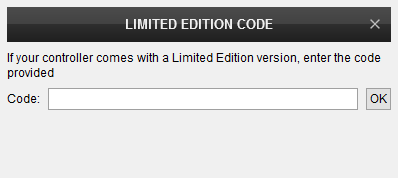
The LE Keycode can be also entered in the LICENSES tab of the Config window of VirtualDJ.
Note that once the Keycode is entered and your computer is connected to the Internet at that time, the 30 days of the Pro Trial period will start automatically. During those 30 days, all the features of VirtualDJ will be available. If you wish to keep all the features after the end of the trial period, an upgrade path is available to either a Plus or a Pro Infinity license. See more details at http://www.virtualdj.com/buy/index.html
The tailored skin of the XDJ-R1 will be automatically used. Use the 2-4 DECKS button at the top of the skin to toggle between the 2 and 4 Decks views.
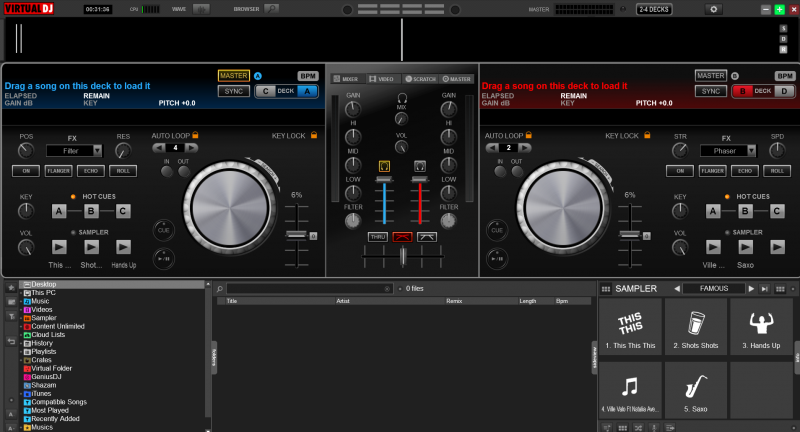
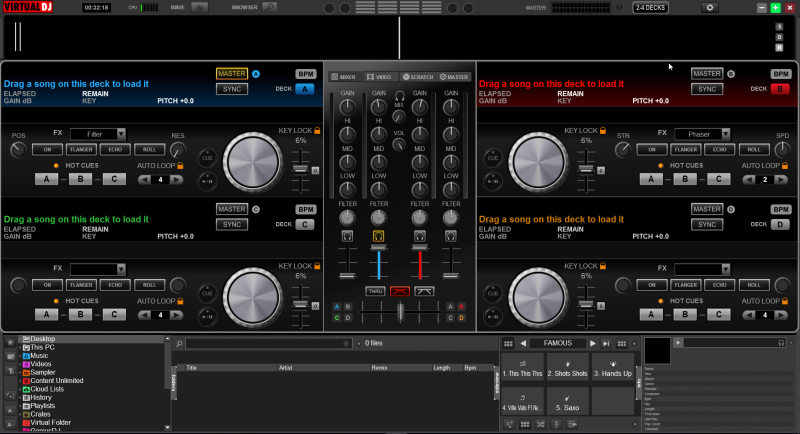
This operation is also available with the SHIFT+BROWSE (19) knob is pushed on the XDJ-R1.

The tailored skin of the XDJ-R1 is also available for download from our Add-ons page http://www.virtualdj.com/plugins/index.html?addonid=80369 for the users who own a License and need to use this skin without installing VirtualDJ 8 LE.
